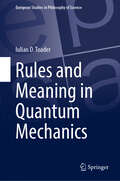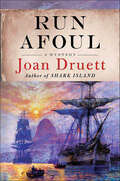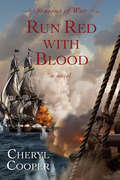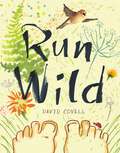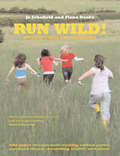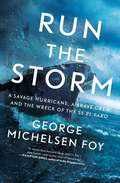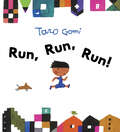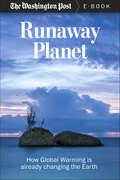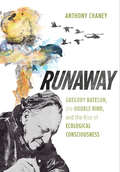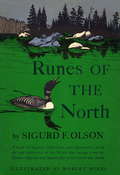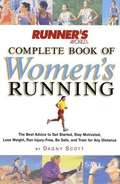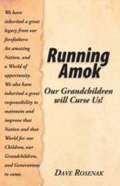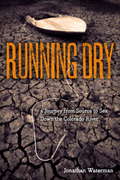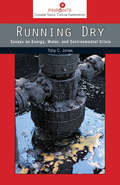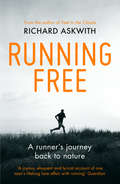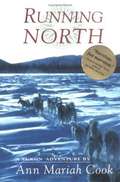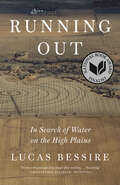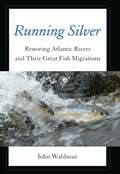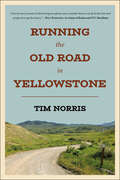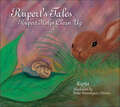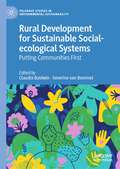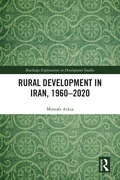- Table View
- List View
Rules and Meaning in Quantum Mechanics (European Studies in Philosophy of Science #13)
by Iulian D. ToaderThis book pursues an investigation at the intersection of philosophy of physics and philosophy of language, and offers a critical analysis of rival explanations of the semantic facts of quantum mechanics. The author presents new insights, including a reworking of Einstein's incompleteness argument, a fresh take on Bohr's correspondence principle, and several critiques of recent views in the philosophy of quantum logic. The book will be of interest to scholars and students whose philosophical work concerns language, logic, or physics.
Ruminant (Horned) Herbivores (World of Animals: Mammals #6)
by Pat Morris Amy-Jane BeerDiscusses cattle, deer, and sheep from around the world
Run Afoul: A Mystery (Wiki Coffin Mysteries #3)
by Joan DruettU.S. Exploring Expedition linguist Wiki Coffin sails with the famous convoy of ships toward Brazil, where he faces a whole new set of trials and tribulations, not the least being blamed for the sudden grave illness of a fellow crewman. But soon his own fate will be the least of his problems. As the great flagship Vincennes leads the convoy under the dubious command of eccentric captain Charles Wilkes toward a dramatic entrance in the port of Rio, careless maneuvering leads one of the vessels to run afoul of a Salem trading ship. The trader is owned and commanded by none other than the famous and larger-than-life Captain William Coffin, father to Wiki and sailor of all seven seas (plus another dozen or so he's managed to invent in his years of telling tall tales). The encounter sets in motion a series of chaotic events that reunite Coffin with his illegitimate half-Maori son and that will see two men dead, Captain Coffin on trial for murder, and Wiki working feverishly to unmask the real killers before the Expedition sails on—leaving his father at the mercy of an unforgiving Brazilian court.
Run Red with Blood: Come Looking For Me / Second Summer Of War / Run Red With Blood (Seasons of War #3)
by Cheryl CooperThings quickly go from bad to worse as Emily, Captain Fly Austen, and young Magpie each find themselves in treacherous waters. In late September 1813, Fly Austen is ordered back to the American coast, as England’s Royal Navy has suffered a series of humiliating defeats. Forced to return to sea with a skeleton crew, Fly persuades a reluctant Leander Braden to accompany him one last time. Emily, fearing she will be left behind in Portsmouth, disguises herself as a man and steals aboard Fly’s frigate. Meanwhile, young Magpie is captured by a press gang and hustled aboard a hostile ship, only to find himself in the dangerous company of the English traitor Thomas Trevelyan. A shipwreck, a mutiny, and a bloody encounter with American ships on the Atlantic inflict devastating consequences on all.
Run Wild
by David CovellGet back to nature in this gorgeous sunlit filled book that celebrates the joy of being outdoors."Hey, you! Sky's blue!" a girl shouts as she runs by the window of a boy bent over his digital device. Intrigued, the boy runs out after her, leaving his shoes (and phone) behind, and into a world of sunshine, dewey grass, and warm sand. Filled with the pleasures of being alive in the natural world, Run Wild is an exquisite and kid-friendly reminder of how wonderful life can be beyond doors and screens.
Run Wild!: Outdoor Games and Adventures
by Fiona Danks Jo SchofieldReplace screen time with fresh air fun. “Here’s a book that will bring the ‘great’ back into the great outdoors.” —Michael Morpurgo, author of War HorseFollowing the success of Nature’s Playground, Go Wild!, and Make it Wild!, in their latest book, Run Wild!, Jo Schofield and Fiona Danks focus on inspiring children of all ages.“[Run Wild!] introduces a cornucopia of ideas for outdoor activities, along with mesmerizing color photos of children and teens creatively enjoying themselves in fields, woods, and backyards, and at rivers and beaches. The text and safety tips are aimed at parents and counselors organizing activities in the wild, but the high-quality color photos will draw a younger audience as well . . . From skimming stones to making leaf masks to whittling walking sticks to following treasure trails, here’s an enticing array of ideas for outdoor fun and wilderness discovery.” —Booklist
Run the Storm: A Savage Hurricane, a Brave Crew, and the Wreck of the SS El Faro
by George Michelsen Foy“Here is the pitch-perfect pairing of subject and author, a gripping deconstruction of one of recent history’s most terrible and vexing sea tragedies…A meticulous forensic study that, in Foy’s able hands, rises to the level of literature.” —Hampton Sides “Fans of The Perfect Storm and Into Thin Air will love this exquisitely written and dramatic book. George Foy has an action story that doesn’t quit.” —Doug Stanton “Foy is an experienced mariner who clearly knows his stuff, which gives the reader confidence in his account, and allows us to get lost in an amazing story that builds to a wild finish.” —John U. Bacon In the bestselling tradition of The Perfect Storm and The Finest Hours, a harrowing true account of the mysterious disappearance of the SS El Faro, a gigantic American cargo ship that sank in the Bermuda Triangle, taking with it thirty-three lives.On October 1, 2015, the SS El Faro, a massive American cargo ship that made regular runs between Jacksonville, Florida and Puerto Rico, delivering everything from deodorant to new Chevrolets, disappeared in Hurricane Joaquin, a category 4 storm. The ship, its hundreds of shipping containers, and its entire crew plummeted to the bottom of the ocean, three miles down. The sinking was the greatest seagoing US merchant marine shipping disaster since World War II. The massive ship had a seasoned crew, state-of-the-art navigation equipment, and advance warning of the storm. It seemed incomprehensible that such a ship could sink so suddenly. How, in this day and age, could something like this happen? The answer is that a ship as large as the El Faro doesn’t vanish for just one reason; it vanishes because many factors intersect—everything from hurricane-tracking algorithms to the decay of rubber gaskets on hatches to the arcane science of loading cargo containers to the psychology of a powerful ship’s captain. All of these factors and more came into play in the sinking of the El Faro. Relying on Coast Guard inquest hearings as well as on numerous interviews, George Michelsen Foy has crafted a brilliant account that brings to life the final voyage of El Faro, a story that lasts only a few days but which grows almost intolerably suspenseful as deep-rooted flaws leading to the disaster inexorably link together and worsen. We see captain, engineers, and crew fight for their lives, and hear their actual words (as recorded on the ship’s black box) while the hurricane relentlessly tightens its noose around the ship. We watch, minute by minute, all that is happening on board—the ship’s mysterious tilt to one side, worried calls to the engine room, ship-to-shore reports, the courage of the men and women as they fight to survive, and the berserk ocean’s savage consumption of the massive hull. And through it all, the pain and ultimate resilience of the families of El Faro’s crew. Meticulous and absolutely thrilling, Run the Storm is a masterwork of stunning power.
Run, Run, Run!
by Taro GomiRun, Run, Run! is a fun, fun, fun board book for on-the-go toddlers!It's time to run a race like no other! Finish line? Winning? None of that matters here. Exploring is the goal! In this colorful board book by bestselling author-illustrator Taro Gomi, follow the racer as he runs far past the finish line and through fields, a farm, a forest, and more. Toddlers will delight in turning the pages to find out where he will run, run, run to next!Ideal for fans of Taro Gomi and his popular children's books, including the classic Everyone Poops, My Friends, Little Truck, and Little Chicks, this board book combines irresistibly expressive artwork and energetic text to create a read-along story parents and kids will not walk but run to read again and again.PERFECT FOR ACTIVE TODDLERS: Not only do toddlers love to run—they love to run everywhere! This spirited board book gives little ones a glimpse of what it's like to run in cities, farms, forests, and more, letting them live out their dreams of running free with the whole world at their feet. It's the ultimate board book adventure!CELEBRATES THE POWER OF IMAGINATION: It's a toddler's dream come true: running (and running) everywhere! The youngest readers will delight in exploring a variety of scenes and reveling in the little racer's ideal race. A GREAT GIFT: This colorful, detail-rich board book is the perfect present for young ones just starting to walk and run. Not only will it inspire them, but it will help to redefine what winning means when experience is the goal! Great for baby shower, new baby, or child's birthday gift giving.Perfect for:Fans of Taro Gomi and Everyone PoopsGift-givers seeking a sweet and engaging board bookParents, grandparents, caregivers, and storytime leaders who love sharing fun stories and vibrant art with babies and toddlersRunners and joggers who want to share their outdoor hobby with the kids in their lives
Runaway Planet: How Global Warming is already changing the Earth
by The Washington PostSaving the world won't happen on the silver screen. In our fragile ecosystem, climate change is swiftly becoming the defining issue of how to prepare—and protect—the earth for the future. The climate change debate raged on in America in 2015, but the facts and the science now show irrefutably that our world is rapidly changing, and that irreparable damage has already begun. From rising sea levels to the spread of disease-carrying insects, from disappearing glaciers to the hottest temperatures ever recorded, climate change as a direct result of human beings’ actions affects everyone, and for many it is a matter of life or death. But progress is being made—with an historic United Nations meeting in Paris, with pledges by over one hundred countries to reduce emissions, with simple awareness. While many changes cannot be undone, great strides can still be made to stabilize regions most likely to be affected by climate change over the course of future generations. The Washington Post tackles this issue in vivid detail, profiling those who are at the forefront of the climate change debate—and those who are in the field, promoting the causes and doing the science that both warns and advocates for a safer tomorrow, for the earth and all its inhabitants.
Runaway: Gregory Bateson, the Double Bind, and the Rise of Ecological Consciousness
by Anthony ChaneyThe anthropologist Gregory Bateson has been called a lost giant of twentieth-century thought. In the years following World War II, Bateson was among the group of mathematicians, engineers, and social scientists who laid the theoretical foundations of the information age. In Palo Alto in 1956, he introduced the double-bind theory of schizophrenia. By the sixties, he was in Hawaii studying dolphin communication. Bateson's discipline hopping made established experts wary, but he found an audience open to his ideas in a generation of rebellious youth. To a gathering of counterculturalists and revolutionaries in 1967 London, Bateson was the first to warn of a "greenhouse effect" that could lead to runaway climate change.Blending intellectual biography with an ambitious reappraisal of the 1960s, Anthony Chaney uses Bateson's life and work to explore the idea that a postmodern ecological consciousness is the true legacy of the decade. Surrounded by voices calling for liberation of all kinds, Bateson spoke of limitation and dependence. But he also offered an affirming new picture of human beings and their place in the world—as ecologies knit together in a fabric of meaning that, said Bateson, "we might as well call Mind."
Runes of the North
by Sigurd F. OlsonIn Runes of the North Sigurd F. Olson explores the haunting appeal of the wilderness. He recounts how the legends of the northern vastness of Canada and Alaska have influenced him, weaving the tales and myths with his own stories and experiences as an explorer, writer, grandfather, and biologist. Now available in paperback for the first time, Runes of the North is a mystical and reflective guide to the northern wilderness written with a oneness and communion with nature that is unique to Olson's pen. It is a work filled with beauty, wisdom, and renewal.
Runner's World Complete Book of Women's Running: The Best Advice to Get Started, Stay Motivated, Lose Weight, Run Injury-Free, Be Safe, and Train for Any Distance
by Dagny ScottHere, in one neat package, is pretty much everything you need to know about trail running--running, that is, on dirt trails, not pavement. It isn't (or, at least, it doesn't have to be) torture, endless hours of negotiating tricky mountain paths and inclement weather. Trail running is, we're told, less hazardous, less painful, and less exhausting than pavement-pounding. It's all about relaxation and communing with nature. The book is full of tips, some of them presented in a helpful, question-and-answer format; there's an excellent chapter on outfitting yourself for trail running; another on how best to train before a run; another on preparing, if you're so inclined, for a marathon. The author, a longtime trail runner, approaches the subject from a commonsensical, practical angle, avoiding pseudophilosophical claptrap about the deep meaning of running. Instead, he offers a hands-on, nuts-and-bolts, filled-to-the-brim users' manual that targets both veteran and beginning trail runners.
Running Amok: Our Grandchildren Will Curse Us!
by Dave RosenakA Call to Action: The Whats, Wheres, Whys, and Hows for us as a Society to form a more Perfect Union and a Brighter Future.
Running Dry
by Jonathan WatermanIn 1869, John Wesley Powell led a small party down the Green and Colorado Rivers in a bold attempt to explore the Grand Canyon for the first time. After their monumental expedition, they told of raging rapids, constant danger, and breathtaking natural beauty of the American landscape at its most pristine.Jon Waterman combines sheer adventure and environmental calamity in this trailblazing cautionary account of his 2008 trip down the overtaxed, drying Colorado. Dammed and tunneled, forced into countless canals, trapped in reservoirs and harnessed for electricity, what once was untamed and free is now humbled, parched, and so yoked to human purposes that in most years it trickles away 100 miles from its oceanic destination.Waterman writes with informal immediacy in this eye-witness account of the many demands on the Colorado, from irrigating 3.5 million acres of farmland to watering the lawns of Los Angeles. He shows how our profligacy and inexorable climate change spark political conflict, and how we can avert this onrushing ecological crisis. As he follows Powell afloat and afoot, Waterman reaches out both to adventure travelers and to scientists, conservationists, environmentalists, and anyone interested in the fragile interplay between nature and humans.
Running Dry
by Toby Craig JonesThe world's water is under siege. A combination of corporate greed, the elite pursuit of political power, and our unrelenting reliance on carbon-based energy is accerlating a broad range of environmental and political crises. Potentially catastrophic climate change, driven primarily by the consumption of oil and gas, threatens the environment in a variety of ways, including producing unprecedented patterns of heavy weather and superstorms in some places and droughts in others. Alongside intensifying environmental dangers posed by our reliance on carbon energy, the conditions of modern life, from happiness to the possibility of democratic politics, are also being undermined. In Running Dry, historian Toby Craig Jones explores how modern society's unquenchable thirst for carbon-based energy is endangering the environment broadly, as well as the historical roots of this threat. This accessible book examines the history of the "energy-water nexus," the ways in which oil and gas extraction poison and dry up water resources, the role of corporate "science" in deflecting attention away from the emerging crises, and the ways in which the rush to capture more energy is also challenging America's democratic order.
Running Dry: A Journey From Source to Sea Down the Dying Colorado River
by Jonathan WatermanDammed and tunneled, forced into countless canals, trapped in reservoirs and harnessed for electricity, what once was untamed and free is now humbled, parched, and so yoked to human purposes that in most years it trickles away 100 miles from its oceanic destination. Waterman writes with informal immediacy in this eye-witness account of the many demands on the Colorado, from irrigating 3.5 million acres of farmland to watering the lawns of Los Angeles. He shows how our profligacy and inexorable climate change spark political conflict, and how we can avert this onrushing ecological crisis. As he follows Powell afloat and afoot, Waterman reaches out both to adventure travelers and to scientists, conservationists, environmentalists, and anyone interested in the fragile interplay between nature and humans.
Running Free: A Runner’s Journey Back to Nature
by Richard AskwithShortlisted for the 2015 Thwaites Wainwright prize for nature writing Richard Askwith wanted more. Not convinced running had to be all about pounding pavements, buying fancy kit and racking up extreme challenges, he looked for ways to liberate himself. His solution: running through muddy fields and up rocky fells, running with his dog at dawn, running because he's being (voluntarily) chased by a pack of bloodhounds, running to get hopelessly, enjoyably lost, running fast for the sheer thrill of it. Running as nature intended. Part diary of a year running through the Northamptonshire countryside, part exploration of why we love to run without limits, Running Free is an eloquent and inspiring account of running in a forgotten, rural way, observing wildlife and celebrating the joys of nature.An opponent of the commercialisation of running, Askwith offers a welcome alternative, with practical tips (learned the hard way) on how to both start and keep running naturally – from thawing frozen toes to avoiding a stampede when crossing a field of cows. Running Free is about getting back to the basics of why we love to run.
Running North: A Yukon Adventure
by Ann Mariah CookAlaska is more than just the largest state in the Union; it's also a state of mind, as Ann Mariah Cook found out. Together with her husband, 3-year-old daughter, and 32 purebred Siberian huskies, she moved there from New Hampshire in order to train for the legendary Yukon Quest, the most rigorous sled-dog race in the world. Her tough, thoughtful memoir, Running North, chronicles the ordeals as well as the rewards of their mushers' life. In the course of their transformation from cheechakos, or greenhorns, to sourdoughs, or seasoned Alaskans, Cook and her husband learned to defend themselves and their dogs from extreme weather, adapted to mushing in Alaskan conditions, and even absorbed the niceties of Yukon social customs (hint: always put on a pot of coffee for visitors). The book ends with a harrowing account of the race, complete with packs of wolves, howling blizzards, minus-60-degree temperatures, and a few narrow escapes. But this is as much Ann's story as it is her husband's, and as a result it goes far beyond the confines of a simple adventure story. Full of intriguing glimpses into sled-dog (and musher) psychology as well as lyrical observations about the beauty of the Yukon landscape, Running North is as much concerned with the who and why of adventure as with its how and when. Leaving behind the comfort and security of Cook's New England life required a multitude of adjustments, from the design of the dogs' booties to a new appreciation of interior decorating, Alaska-style. In the end, however, it was going home that proved hard: "Returning to New Hampshire, I saw my life as a stranger might view it. I could not get used to so many houses, so many neighbors, so many social demands. Everything in my life had been redefined in only seven and a half months."
Running Out: In Search of Water on the High Plains
by Lucas BessireFinalist for the National Book AwardAn intimate reckoning with aquifer depletion in America's heartlandThe Ogallala aquifer has nourished life on the American Great Plains for millennia. But less than a century of unsustainable irrigation farming has taxed much of the aquifer beyond repair. The imminent depletion of the Ogallala and other aquifers around the world is a defining planetary crisis of our times. Running Out offers a uniquely personal account of aquifer depletion and the deeper layers through which it gains meaning and force.Anthropologist Lucas Bessire journeyed back to western Kansas, where five generations of his family lived as irrigation farmers and ranchers, to try to make sense of this vital resource and its loss. His search for water across the drying High Plains brings the reader face to face with the stark realities of industrial agriculture, eroding democratic norms, and surreal interpretations of a looming disaster. Yet the destination is far from predictable, as the book seeks to move beyond the words and genres through which destruction is often known. Instead, this journey into the morass of eradication offers a series of unexpected discoveries about what it means to inherit the troubled legacies of the past and how we can take responsibility for a more inclusive, sustainable future.An urgent and unsettling meditation on environmental change, Running Out is a revelatory account of family, complicity, loss, and what it means to find your way back home.
Running Silver: Restoring Atlantic Rivers and Their Great Fish Migrations
by John WaldmanThat one could “walk drishod on the backs” of schools of salmon, shad, and other fishes moving up Atlantic coast rivers was a not uncommon kind of description of their migratory runs during early Colonial times. Accounts tell of awe-inspiring numbers of spawners pushing their way upriver, the waters “running silver,” to complete life cycles that once replenished critical marine fisheries along the Eastern Seaboard. This is a hugely important, fascinating, and unique look at the fish of North America whose history and life-cycles and conservation challenges are poorly understood. Despite these primordial abundances, over the centuries these stocks were so stressed that virtually all are now severely depressed, with many biologically or commercially extinct and some simply forgotten. Running Silver will tell the story of the past, present and future of these sea-river fish. This important book will elevate public consciousness of the contrasts between the historical and the present to show the enormous legacy that has already been lost and to help inspire efforts to save what remains. Drawing on the author's thirty-year career as a scientist and educator with a passion for the native river fish of the North East, Running Silver tells the story of these endangered fish with a mix of research, historical accounts, anecdotes, personal experience, interviews, and images.
Running on Sunshine: How Does Solar Energy Work? (Let's-Read-and-Find-Out Science 2)
by Carolyn Cinami DeCristofanoRead and find out about solar energy in this colorfully illustrated nonfiction picture book.The sun is a source of energy for living things. Energy that comes from sunshine is called solar energy. But how does solar energy work? And how can we use solar energy to not only stay on the cutting-edge of technology, but to help keep the environment healthy? Read and find out about solar roads that light up when there’s danger ahead, like a moose on the road—and did you know that someday tiny solar chips placed in someone’s eyes could help a blind person see? Learn all this and more!Running on Sunshine comes packed with visual aids like charts, sidebars, an infographic, and a hands-on activity—how to direct sunlight using mirrors! Both the text and the artwork were vetted for accuracy by Dr. Bart Bartlett, Associate Professor of Chemistry at the University of Michigan.This is a clear and appealing science book for early elementary age kids, both at home and in the classroom. It's a Level 2 Let's-Read-and-Find-Out, which means the book explores more challenging concepts for children in the primary grades. The 100+ titles in this leading nonfiction series are:hands-on and visualacclaimed and trustedgreat for classroomsTop 10 reasons to love LRFOs:Entertain and educate at the same timeHave appealing, child-centered topicsDevelopmentally appropriate for emerging readersFocused; answering questions instead of using survey approachEmploy engaging picture book quality illustrationsUse simple charts and graphics to improve visual literacy skillsFeature hands-on activities to engage young scientistsMeet national science education standardsWritten/illustrated by award-winning authors/illustrators & vetted by an expert in the fieldOver 130 titles in print, meeting a wide range of kids' scientific interestsBooks in this series support the Common Core Learning Standards, Next Generation Science Standards, and the Science, Technology, Engineering, and Math (STEM) standards. Let's-Read-and-Find-Out is the winner of the American Association for the Advancement of Science/Subaru Science Books & Films Prize for Outstanding Science Series.
Running the Old Road in Yellowstone: One Man's Journey of Discovery and Redemption
by Tim NorrisAn inspiring and transporting book detailing one man's journey of self-realization as he spends time working and running in Yellowstone.A testament to the human spirit and the healing power of nature, Tim Norris&’ autobiographical Running the Old Road in Yellowstone is proof that running toward your problems is a lot better than running away.An avid runner with an adventurer&’s soul, Norris finds himself out of work and out of luck. When he lands a chance to work at Old Faithful in Yellowstone National Park for a summer season, the choice seems obvious: who could refuse a steady paycheck and a breathtaking natural environment, full of new running trails to explore?Set against the backdrop of one of the world&’s most magnificent natural wonders, Running the Old Road in Yellowstone shares Norris&’ journey along a trail of setbacks, switchbacks and saving graces.
Rupert's Tales: Rupert Helps Clean Up
by KyrjaRupert the rabbit is curious, furry, brown, and helpful, and it seems his lessons never end! With the help of human, animal, and fairy friends, he learns about reducing, reusing, and recycling, and how each of us has an important part to play in taking care of the world around us. A cloud of dragonflies, a singing frog, a lonely snail, a smart cat, and even a clever crow all have things to teach Rupert throughout his adventures in these four stories. Rupert's Tales are enhanced by 40 vivid pastel illustrations that create scenes sure to spark a sense of wonder at the beauty of nature. Lyrically enchanting, Rupert's adventures lovingly introduce children to the important task of fostering our natural environment.
Rural Development for Sustainable Social-ecological Systems: Putting Communities First (Palgrave Studies in Environmental Sustainability)
by Séverine Van Bommel Claudia BaldwinThis book provides an overview of interdisciplinary approaches that have applied social science to research focused on issues around food, agriculture and natural resource management. The book demonstrates that those who work in rural sociology either as researchers or practitioners apply community development and participatory techniques to socio-environmental interaction. The book discusses how the evolving concept of interconnected social and ecological systems (SES) emerged, recognizing the inherent complexity, adaptive nature, and resilience of such systems. This book engages with contemporary theory, as well as new cutting-edge transdisciplinary research evidenced in case studies from three continents.
Rural Development in Iran, 1960-2020 (Routledge Explorations in Development Studies)
by Mostafa AzkiaThis book is an authoritative account of rural development in Iran, spanning 60 years and 2 distinct political regimes.Professor Mostafa Azkia has spent many decades demonstrating the importance of participatory rural development, not only in addressing rural problems but also in reducing urban concerns, such as unemployment and overpopulation. This book is the culmination of this work, bringing together a detailed analysis of the theories, history, and strategies of rural and state development in Iran both before and after the Islamic Revolution. Putting rural communities at the fore, the book demonstrates that there has been significant progress in reducing the rural– urban gap, both in terms of income and standards of living, resulting in a more equal path of socioeconomic development for Iran.This comprehensive assessment from Iran’s foremost rural sociologist will be an important read for researchers and professionals working on rural development and sociology in the Middle East.
